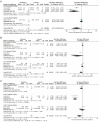Probiotics improve intestinal ischemia-reperfusion injury: a systematic review and meta-analysis
- PMID: 40486191
- PMCID: PMC12142053
- DOI: 10.3389/fmed.2025.1546650
Probiotics improve intestinal ischemia-reperfusion injury: a systematic review and meta-analysis
Abstract
Background: Intestinal ischemia-reperfusion injury (IRI) is a common complication of intestinal surgery and carries the risk of patient death. The treatment of intestinal IRI is an important direction of current research. This study aimed to analyze animal experiments and thus investigate the effects of probiotics administration on intestinal IRI and its mechanisms.
Methods: We included a total of 12 studies from 5 databases (PubMed, Web of Science, Cochrane, Embase, and Scopus), incorporating outcome metrics including Chiu's score, levels of malondialdehyde (MDA), myeloperoxidase (MPO) tumor necrosis factor-alpha (TNF-α), IL-6, IL-1β, occludin, zonula occludens-1 (ZO-1), FITC-dextran and intestinal bacteria (Lactobacillus, Bacteroides and Bifidobacteria). Statistical analysis was performed using Review Manager 5.3.
Results: We found that probiotic-added animals had less intestinal damage after IRI compared to controls, as evidenced by a more intact intestinal barrier [occludin (2.83, 95% CI: 1.46 to 4.20, p < 0.0001), ZO-1 (3.30, 95% CI: 1.58 to 5.01, p = 0.0002) and FITC-dextran (-3.83, 95% CI: -5.83 to -2.29, p < 0.0001)], lower Chiu score (-1.83, 95% CI: -2.47 to -1.20, p < 0.0001), fewer inflammatory factors [IL-6 (-2.19, 95% CI: -3.98 to -0.39, p = 0.02), TNF-α (-2.24, 95% CI: -4.15 to -0.33, p = 0.02)], and lower levels of oxidative stress [MDA (-2.46, 95% CI: -4.62 to -0.30, p = 0.03), MPO (-0.97, 95% CI: -1.77 to -0.17; p = 0.02)]. In addition, probiotic supplementation increased the relative abundance of Lactobacillus (0.90, 95% CI: 0.33 to 1.48, p = 0.002) and Bacteroides (0.81, 95% CI: 0.14 to 1.49, p = 0.02), thus maintaining the stability of the gut microbiota.
Conclusion: In conclusion, the mechanisms by which probiotic therapy attenuates intestinal IRI may be related to decreased levels of inflammation and oxidative stress, increased probiotic abundance, and increased expression of tight junction (TJ) proteins.
Systematic review registration: https://www.crd.york.ac.uk/PROSPERO/view/CRD42024577459.
Keywords: intestine; ischemia-reperfusion injury; meta-analysis; probiotics; systematic review.
Copyright © 2025 Zhao, Wu, Leng, Chang, Wang, Li and Xing.
Conflict of interest statement
The authors declare that the research was conducted in the absence of any commercial or financial relationships that could be construed as a potential conflict of interest.
Figures







References
-
- Zhong J, Sun Y, Han Y, Chen X, Li H, Ma Y, et al. . Hydrogen sulfide-loaded microbubbles combined with ultrasound mediate thrombolysis and simultaneously mitigate ischemia-reperfusion injury in a rat hindlimb model. J Thromb Haemost. (2021) 19:738–52. doi: 10.1111/jth.15110, PMID: - DOI - PMC - PubMed
Publication types
LinkOut - more resources
Full Text Sources
Research Materials
Miscellaneous

